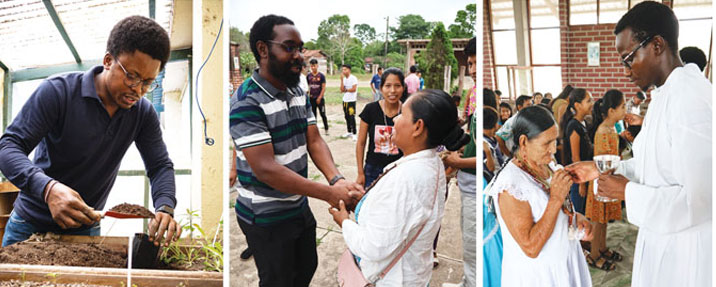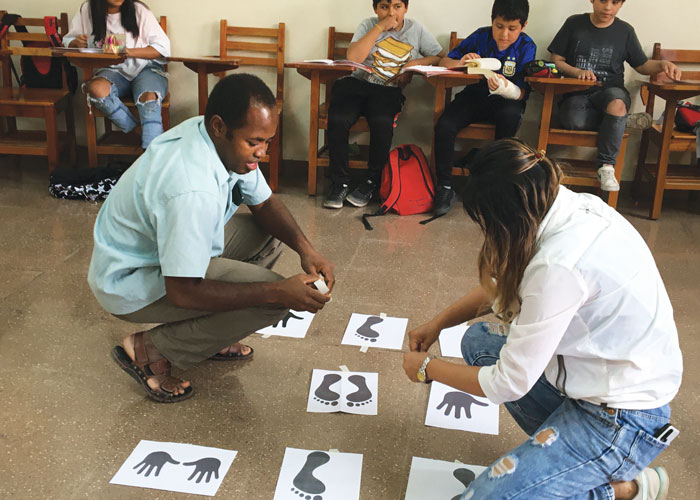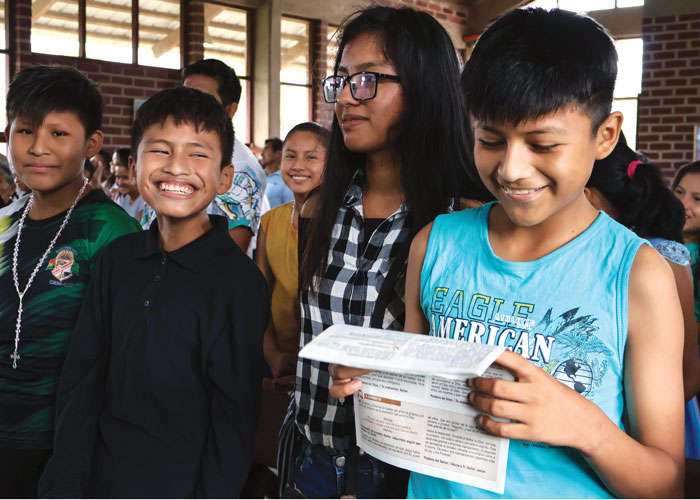Maryknoll seminarians in Bolivia respond to pastoral needs and discern a lifetime of mission.
Few places on earth are as challenging as the Amazon rainforest. Yet that is precisely where four Maryknoll seminarians are training to become missionary priests.
The young men are spending two years in Bolivia as part of their Overseas Training Program — an essential part of formation for Maryknoll priest and brother candidates.
“The first requirement of OTP is that they really experience a missioner’s life,” says Maryknoll Father Alejandro Marina, the local program coordinator. “What it is like living in another culture, another language, and whether they will feel comfortable.”
Leonard Kabaka, 27, says that every month they accompany Father Alejandro to the Amazon. “We carry our mission activities to different villages in the forests,” he explains.
Another candidate, Lawrence Mutiso, 30, adds that the experience is “the core” of his mission learning in Bolivia.
The missioners assist in the Isiboro Sécure National Park and Indigenous Territory (known by its Spanish acronym TIPNIS). Maryknoll was invited to serve there by Father Enrique Bustamante Ramírez of the Archdiocese of Cochabamba, who oversees pastoral care in this rugged tract of over 4,700 square miles. Roughly six dozen small communities are spread throughout the territory. Most of the 14,000 inhabitants are Catholic.
“The main challenge is access,” says Kabaka, of Kisii, Kenya. Some communities can be reached only by boat — depending on water levels. Once, to get to the next village, he recalls, they had to push, rather than row, their canoe. “It took three hours,” the seminarian says. “But that’s what mission is all about. Bringing the Good News and sharing it with the people.”
Although on paper TIPNIS is doubly protected as a national park and as Indigenous-held land, the reality is different. Climate change and socioeconomic upheaval are exacerbating already existing poverty. Illegal logging and land theft by outsiders are increasingly common.

“People are migrating to the Amazon to farm,” Mutiso says. “And the more they migrate, the more they cut down trees.” Deforestation is both cause and effect of wildfires that rage out of control.
Julia Molina is secretary of the parish of Santísima Trinidad (Most Holy Trinity) in a town of the same name. “God gave us nature. We have to care for it,” she says.
She weeps as she lists the “disasters” facing her Mojeño-Trinitario community: stripped forests, high temperatures “that don’t let us sleep,” drought, dry riverbeds and the loss of fishing and irrigation.
“The Church gives me strength,” Molina says through tears.
Pastoral care is crucial. “Without someone to enrich you with the Word, the Body and Blood of Christ, you start losing faith,” says Mutiso, of Machakos, Kenya.
He and Kabaka usually stay on for another week after Father Marina and the other two seminarians return to their responsibilities in the city of Cochabamba.
“Here at the Maryknoll center (in Cochabamba), we have staff,” Father Marina says. “There, they have to care for the house and cook. It’s a whole training of how to organize your life in mission.”
Father Marina notes that the community had some children and youth of age for First Communion and Confirmation. “Kabaka and Lawrence offered to prepare the program,” he says. “If they go to a parish that is already set up, the pastor or director says, ‘do this.’ But in TIPNIS they had to think about the program — and how to give it. They had to modify what they prepared to adapt to the concrete people in front of them.”
As a result of their effort, last October, 20 children received their First Communion and 15 young adults were confirmed, he says.

Upon arriving in Cochabamba, each candidate begins OTP with a homestay with a local host family, followed by six months of language study at the Maryknoll center. Afterward they are given the opportunity to serve in a wide range of ministries.
Yohana Maswizilo, 34, was eager to begin serving. “I thought to wait would not help me,” he says, “because I need to learn more about the culture of the people, and mission.” The seminarian, from Buhangija in Shinyanga Region, Tanzania, has found a spiritual home in Santa Ana of Cala Cala. In this parish — founded by Maryknoll — he assists on the altar and helps with religious education.
Last year, Maswizilo accompanied the First Communion class for children. “I decided to start with that age because of the language,” he says, “but also to experience how the classes are being done.” This year, he will move up to older groups.
At Santa Ana, Maswizilo also discovered a new ministry: Alcoholics Anonymous. He says about the group members, who meet there regularly, “I am learning from them to be compassionate.”
Trying out new ministries is part and parcel of the formation program, says Father Marina.
“OTP is open for you to express the gifts that you have, the talents you have been given by God,” says Barrack Odeka, 32, from Sindo in Homa Bay, Kenya. “You present yourself, put yourself there, and allow God to do his work.”

Odeka says that for him care of creation started from home. “Where I come from, we are surrounded by mountains and the lake,” says the seminarian. “Most people who are not employed do farming and fishing.” In Cochabamba and TIPNIS, he grows trees for reforestation.
Some of the young trees will take 10 years to mature. At first the villagers in the Amazon were not enthusiastic about tending these saplings in the nursery, Father Marina says. “I asked them, ‘What is happening? If you don’t care for them, they won’t grow,’” he recalls.
“They told me, ‘Father, we understand the need to grow these trees. But we also need to make money. We need cacao trees, too, so we can sell the cacao. Because if we have only these trees, what will happen is that we will need money … and then we will cut them to sell!’”
The solution, Odeka learned, is to grow both.
Besides the trips to TIPNIS, Odeka goes to El Abra prison in Cochabamba on Thursdays for a Communion service attended by about 40 inmates.
“There are strong Catholics there who really need Holy Communion,” he says.
Accompanied by seasoned Maryknollers, local communities and each other, the seminarians are being trained for missionary priesthood in a trial by fire.
The hardest thing to witness, they say, is what most motivates them. All four young men have been profoundly moved by the pastoral needs of the local church and its scarcity of ordained ministers — especially in the Amazon.
There, Maswizilo says, “I was able to recognize the hunger of the people.”
Adam Mitchell contributed reporting to this article.
Featured image: In a remote Indigenous community of the Amazon, Maryknoll Seminarians Lawrence Mutiso and Leonard Kabaka (left, right) take Communion to the homebound. (Adam Mitchell/Bolivia) ![]()

